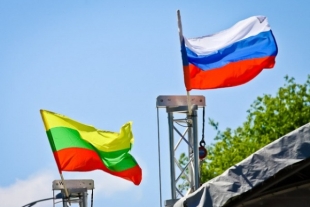Analytics, Baltic States – CIS, EU – Baltic States, Legislation, Lithuania
International Internet Magazine. Baltic States news & analytics
Thursday, 25.04.2024, 23:15
Lithuanian PM's stance on Russia: 2 points in support, 2 against, 2 motives
 Print version
Print version |
|---|
After discussions with diplomats of different institutions, officials and
political experts, BNS Lithuania presents the argumentation in support,
argumentation against and other possible motives.
ARGUMENTATION IN SUPPORT:
1. Supporters of this position say that communication channels are needed
for efficient policies and settlement of the problems the country's residents,
companies, institutions and organizations are faced with, also for possible
closer contacts with the Russian Kaliningrad region. The big Western
democracies maintain contacts with Russia on the highest presidential or prime
ministerial level, while the more critical Eastern European nations make
contacts on the level of ministers or vice-ministers. Lithuania is the only
country of the European Union with no such contacts whatsoever. The prime
minister's team maintains that reintroduction of the intergovernmental
commission would not mean revision of relations. The so-called selective
cooperation in some areas is allowed by the generally-accepted EU guidelines. A
dialogue is usually maintained even between countries at war. "Is it not
the case that Ukraine, which has been most affected by Russia, has more
contacts with Moscow than Lithuania does?," an unnamed official asked
rhetorically. Supporters of the position say that dialogue is the best way of
talking about values, including cases when they are oceans apart.
2. Lithuania sometimes comes under criticism that its calls to isolate
Russia do not fit the call to maintain dialogue with other countries. Lithuania
has initiated an EU meeting with the Israeli prime minister, emphasizing that a
direct dialogue is needed even in major disagreements, although the EU
criticizes him for expansion of settlements in occupied Palestinian
territories. Lithuania has also urged Europe to maintain closer ties with
Turkey, although Western Europeans censure its anti-democratic processes, while
Greece, a NATO and EU member, is at odds with it over occupation of part of
Cyprus. Lithuania is sometimes criticized for an attempt to verge off the NATO
position agreed by all partners that a dialogue with Russia is needed to
enhance military capabilities in the region.
ARGUMENTATION AGAINST:
1. Changes in Lithuania's position can be seen as a concession, weakness or
admitting that Lithuania is in part guilty for the poor bilateral relations.
Moscow may view the resumption of the intergovernmental commission's operations
as a signal of change of stance by Lithuania on other strategic issues, which
were repeatedly raised ahead of the commission's meetings, for instance, on
better conditions for Russian giant Gazprom's operations in Lithuania or weaker
checks on trains transiting Lithuania to Kaliningrad. Resumption of the
commission's operations without any visible progress in the implementation of
the Minsk accords or on the occupation of Crimea by Russia would undermine
Lithuania's efforts to keeping the EU discipline, as well as the consistency in
extending sanctions against Russia and provision of aid to Ukraine. If needed,
resumption of contacts could be discussed after good preparations, with a good
exit strategy and plan.
2. The prime minister publicly stated an opinion that had not been
coordinated with the president or the foreign minister. This undermines the
Lithuanian position on the international arena that Russia should endure
consequences over the occupation of Crimea and support to the Ukrainian
separatists. Return to the usual relations with Moscow would promote
continuation of the aggressive policies. The current contacts on the technical
and embassy level are sufficient, as indicated by Lithuania's growing exports
to Russia and signing of the border demarcation treaty in December. If
Lithuania was unwilling to make concessions, there would be nothing to discuss
at top-level meetings. "It seems like the prime minister is hoping that Russia
will all of a sudden starts taking the interests of Lithuanian citizens into
consideration, although Lithuania continues ignoring the interests of Russia?
Strongly illogical or simply naive," another official said. Politicizing
one of the key foreign and national security matters prevailed by a nationwide
consensus until now is a dangerous move. Internal tensions and contradictions
among the main state institutions would only benefit the Kremlin and its
propaganda.
DOMESTIC POLICY MOTIVES:
1. Skvernelis is aiming to expand its influences and take over some of the
foreign policy mandate from President Dalia Grybauskaite. This could be seen
during the prime minister's visit in Poland and can sometimes be heard in his
rhetoric. According to the Constitution, main foreign policy matters are
decided by the president, while foreign policy is executed in cooperation with
the government. This leaves room for interpretation, which steps are in
connection to main issues and which entail execution of the policies. The prime
minister has shown discontent with the president's failure to consult him on
the Lithuanian stance on the Jerusalem issue and his removal from deciding EU
matters.
2. The prime minister's position may be due to a belief that a large share
of Lithuania's society see the Lithuanian position as too rigid, and his
thoughts may boost his popularity. In his statement, Skvernelis emphasized that
Lithuania would state its position without humiliating the Russian state and
its people, which is a barely disguised criticism to the president's recent
rhetoric to dub Russia as a terrorist state. Some think the steps have to do
with Skvernelis' presidential ambitions, while he has dismissed the insights as
ridiculous. Others say this is an attempt to bring the attention away from
domestic problems.








 «The Baltic Course» Is Sold and Stays in Business!
«The Baltic Course» Is Sold and Stays in Business!

